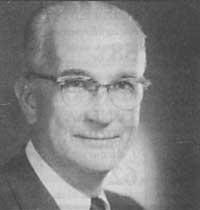Willian Shockley Dies
The father of the transistor, the English physicist William Shockley, died last August 11 in California. Shockley was born in London on February 13, 1910. He studied at the California Institute of Technology and obtained a doctorate from the Masatxusets Institute of Technology in 1936. He later joined the Bell Telephone Research Laboratory. There will be John Bardeen and Walter H. With the help of Brittain he invented the transistor in 1948.
Let's make some history. It is known that some crystals could work as current correctors. Correctors allow the electric current to pass in one direction.

When radio appliances work with alternating current, they need corrective currents. With this intention crystals were used in the first radio apparatus. Later, when the radio valves appeared, the crystals were abandoned and the valves began to be used because they were more effective and simple.
Schockley and his colleagues discovered that germanial crystals with impurities were much better than current correctors used until then. Two types of impurities. On the one hand they were electrons that did not enter the crystal net of the germanium. Then, when applying the electrical potential, the current will go to the positive electrode and not to the negative.
On the other hand, impurities can be electron holes in the crystal net. In this case, the electric current will go to the negative electrode and not to the positive.
This new type of correctors were called transistors. By standardizing the manufacture of transistors and ensuring product reliability, transistors replaced the valves and started miniaturizing the devices.
For this discovery Shockley, Bardeen and Brittain received the Nobel Prize in Physics in 1956.
In 1955 he was appointed head of the Weapons Systems Evaluation Group of the U.S. Department of Defense. Shockley and in 1963 professor at Stanford University.
After receiving the Nobel Prize, as in the case of a few other Nobel laureates, Shockley considered that he could give Shockley a powerful gesture on anything. The broad social recognition of the Nobel Prize is the cause of this behavior.
Shockely chose social anthropology and genetics to bring his hedgehog to light. Their most important point was that intelligence was going to be heritable, so whites are smarter than blacks because they are genetically better. On the other hand, he proposed the sterilization of the intelligence coefficient of children under 100. They would have financial compensation.
On the other hand, considering that the presence of geniuses depended on hereditary factors, it was one of the donors when the seed bank was opened for the cultivation of geniuses in California.





